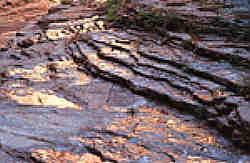Earth Sciences (also referred to as Geosciences), which deals with basic issues surrounding our planet, plays a vital role in the area of energy and raw materials supply.
Earth Sciences comprises subjects such as geology, geography, geological informatics, paleontology, mineralogy, petrography, crystallography, geophysics, geodesy, glaciology, cartography, photogrammetry, meteorology and seismology, early-warning systems, earthquake research and polar research.

Gold prospectors may one day rely on lowly bacteria to point them to deposits of the precious metal. Researchers have discovered that gold-laden soil often contains an abundance of spores belonging to a certain bacterium. The affinity humans have for gold aside, the ore in its soluble form is actually highly toxic to most living things. The common bacterium Bacillus cereus , however, possesses a unique resistance to the metal, allowing it to survive in a relatively vacant environmental niche:

Core samples taken from far below the ocean floor are helping a University of Edinburgh geologist to form a picture of dramatic climate changes which took place 30 to 40 million years ago. Dr Bridget Wade is part of an international team of scientists studying climate shifts between the Eocene period – the warmest cycle in the last 65 million years – and the cooler Oligocene period, which saw the first major build-up of Antarctic ice. The study could shed new light on present climate trends as the Eo

The most comprehensive picture yet of how dinosaurs evolved has been produced by a team at Bristol University.
More than 1,000 species of dinosaurs have been named since the first skeletons were dug up in the 19th century, and unravelling their patterns of evolution has been a major area of research.
Since 1980, over 150 evolutionary trees of dinosaurs have been published, most of them looking at small groups of species. The Bristol researchers have put all of these smaller

Animals may have beaten upright plants to land.
The oldest fossils of footprints ever found on land hint that animals may have beaten plants out of the primordial seas. Lobster-sized, centipede-like animals made the prints wading out of the ocean and scuttling over sand dunes about 530 million years ago. Previous fossils indicated that animals didn’t take this step until 40 million years later.
“It’s staggering that we thought for all this time that animals appeared on land

Winds bring change to Alaskan winter.
A drop in wind speed may be boosting Alaska’s tourist trade. Some parts of the tundra feel five degrees warmer than they did 50 years ago, even though average winter air temperatures have risen only by one or two degrees since then, new research finds 1 . This local trend hints that forecasts of the impacts of climate change may need to account for wind as well as temperature.
The temperature can still plummet to -40

A European team of researchers has demonstrated that sediment is transported to the deep sea via canyons in the seabed. The sediment accumulates in the head of the submarine canyons. At the end of the canyons, mud avalanches disperse into the deep sea. Scientists from the Netherlands Institute for Sea Research (NIOZ) presented their findings at an international congress held from 7 to 10 April 2002.
With bottom landers, onboard the ship R.V. Pelagia, the researchers explored the Nazaré Canyo